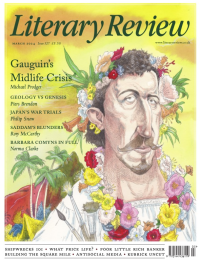Peter Marshall
Pastor with a Poleaxe
The Dreadful History and Judgement of God on Thomas Müntzer: The Life and Times of an Early German Revolutionary
By Andrew Drummond
Verso 384pp £25
Hands up: who’s heard of the German Peasants’ War? Outside of specialist academic circles, the quincentenaries of its outbreak in 1524 and bloody resolution in 1525 are likely to pass largely unnoticed in this country. Even in Germany, commemorations look set to claim only a fraction of the cultural bandwidth occupied by the anniversary of the promulgation of Luther’s Ninety-five Theses in 2017. Yet the German Peasants’ War was by any reckoning an extraordinary event, the largest popular rebellion in western Europe prior to the French Revolution. It rolled across huge swathes of central and southern Germany, Switzerland and Austria, and its suppression by the authorities may have cost a hundred thousand lives.
Peasant rebellions were a semi-regular occurrence in late medieval Europe, particularly in politically fragmented Germany, but the war of 1524–5 was an unprecedented convulsion, brought on by an explosive convergence of circumstances. There had been several bad harvests and a downturn in the rural economy, which landowners sought to ride out by reimposing old-fashioned patterns of feudalism and serfdom on a peasantry increasingly accustomed to forms of village self-government.
The precise relationship between the rebellion and the Reformation was a matter of intense controversy at the time and has been debated ever since. But peasant leaders certainly justified insurrection by invoking ‘God’s law’, and by looking to their own interpretation of what Luther was teaching about grace and salvation. Serfdom was unchristian, according to a set of twelve articles drawn up at Memmingen in Swabia, because ‘Christ has redeemed and bought us all by the shedding of his precious blood’.
Luther himself was having none of it. Stung by Catholic jibes that attacks on the established religious order were bound to lead to the unravelling of the social one, he produced a notorious pamphlet, Against the Robbing and Murdering Hordes of Peasants, and urged the German princes to ‘stab, smite,

Sign Up to our newsletter
Receive free articles, highlights from the archive, news, details of prizes, and much more.@Lit_Review
Follow Literary Review on Twitter
Twitter Feed
Under its longest-serving editor, Graydon Carter, Vanity Fair was that rare thing – a New York society magazine that published serious journalism.
@PeterPeteryork looks at what Carter got right.
Peter York - Deluxe Editions
Peter York: Deluxe Editions - When the Going Was Good: An Editor’s Adventures During the Last Golden Age of Magazines by Graydon Carter
literaryreview.co.uk
Henry James returned to America in 1904 with three objectives: to see his brother William, to deliver a series of lectures on Balzac, and to gather material for a pair of books about modern America.
Peter Rose follows James out west.
Peter Rose - The Restless Analyst
Peter Rose: The Restless Analyst - Henry James Comes Home: Rediscovering America in the Gilded Age by Peter Brooks...
literaryreview.co.uk
Vladimir Putin served his apprenticeship in the KGB toward the end of the Cold War, a period during which Western societies were infiltrated by so-called 'illegals'.
Piers Brendon examines how the culture of Soviet spycraft shaped his thinking.
Piers Brendon - Tinker, Tailor, Sleeper, Troll
Piers Brendon: Tinker, Tailor, Sleeper, Troll - The Illegals: Russia’s Most Audacious Spies and the Plot to Infiltrate the West by Shaun Walker
literaryreview.co.uk